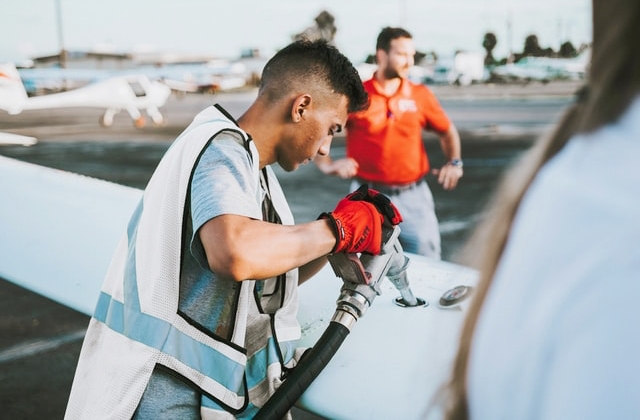The South Korean state defense research agency was said to have developed technologies to produce palm oil-based biofuel for jets. Based on the report, the agency acquired the production technique through a series of tests.
As per Aju Business Daily, the main technologies for the production were discovered, and based on the testing, the low-carbon renewable fuel could be an alternative source of fuel for both the civil and military turbine engines.
The defense agency’s research results
The research was done by the Agency for Defense Development (ADD), and it started in 2016. The ADD is operating under the Defense Ministry, and the production technique for the palm oil-based biofuel for planes was the result of a four-year study and tests.
The Defense Ministry has now developed the procedure that will allow it to churn out five tons of jet biofuel per year. The technique is simple: the researchers made use of a highly reactive solid catalyst, deoxidation process, disintegration, and finally, reconstruction of the palm oil substances.
The ministry revealed that the technique was tested to determine if the manufactured palm oil biofuel meets the Carbon Offsetting and Reduction Scheme for International Aviation’s (CORSIA) requirements. The specifications were set by the International Civil Aviation Organization (ICAO) this year to help control aviation’s impact on climate.
It was said that South Korea uses around 160,000 tons of cooking oil, and these are collected from fried chicken stores. These will not be reused to manufacture biodiesel for the aviation industry.
Korean Air chooses sustainable fuel
Just as the defense ministry is moving to produce palm oil-based fuel for the jets, Biofuels International reported that Korean air is also opting for sustainable aviation fuel. For this, it teamed up with Hyundai Oilbank to take on SAF.
The airline and Hyundai Oilbank signed a Memorandum of Understanding (MoU) for the production and usage of SAF. With the deal, Korean Air is hoping to offset climate change brought about by the aviation industry. Finally, the sustainable fuel for aviation is made of grains, plants, algae, and animal fats, and these can lower a single flight’s emissions by up to 80%.



 U.S. Stocks Close Lower as Hot PPI Data, Nvidia Slide Weigh on Wall Street
U.S. Stocks Close Lower as Hot PPI Data, Nvidia Slide Weigh on Wall Street  Coupang Reports Q4 Loss After Data Breach, Revenue Misses Estimates
Coupang Reports Q4 Loss After Data Breach, Revenue Misses Estimates  Toyota Plans $19 Billion Share Sale in Major Corporate Governance Reform Move
Toyota Plans $19 Billion Share Sale in Major Corporate Governance Reform Move  Nintendo Share Sale: MUFG and Bank of Kyoto to Sell Stakes in Strategic Unwinding
Nintendo Share Sale: MUFG and Bank of Kyoto to Sell Stakes in Strategic Unwinding  Australian Dollar Rallies on Hawkish RBA Outlook; Yen Slips as BOJ Faces Political Pressure
Australian Dollar Rallies on Hawkish RBA Outlook; Yen Slips as BOJ Faces Political Pressure  Panama Investigates CK Hutchison’s Port Unit After Court Voids Canal Contracts
Panama Investigates CK Hutchison’s Port Unit After Court Voids Canal Contracts  Flare, Xaman Roll Out One-Click DeFi Vault for XRP Yield via XRPL Wallets
Flare, Xaman Roll Out One-Click DeFi Vault for XRP Yield via XRPL Wallets  Strait of Hormuz Oil and LNG Shipments Disrupted After U.S.-Israel Strikes on Iran
Strait of Hormuz Oil and LNG Shipments Disrupted After U.S.-Israel Strikes on Iran  BlueScope Steel Shares Drop After Rejecting Revised A$15 Billion Takeover Bid
BlueScope Steel Shares Drop After Rejecting Revised A$15 Billion Takeover Bid  OpenAI Pentagon AI Contract Adds Safeguards Amid Anthropic Dispute
OpenAI Pentagon AI Contract Adds Safeguards Amid Anthropic Dispute  Trump Orders Federal Agencies to Halt Use of Anthropic AI Technology
Trump Orders Federal Agencies to Halt Use of Anthropic AI Technology  Netflix Stock Jumps 14% After Exiting Warner Bros Deal as Paramount Seals $110 Billion Acquisition
Netflix Stock Jumps 14% After Exiting Warner Bros Deal as Paramount Seals $110 Billion Acquisition  Snowflake Forecasts Strong Fiscal 2027 Revenue Growth as Enterprise AI Demand Surges
Snowflake Forecasts Strong Fiscal 2027 Revenue Growth as Enterprise AI Demand Surges  Lynas Rare Earths Shares Surge on Strong Half-Year Earnings and Rising Global Demand
Lynas Rare Earths Shares Surge on Strong Half-Year Earnings and Rising Global Demand  Oil Prices Steady as US-Iran Nuclear Talks and Rising Crude Inventories Shape Market Outlook
Oil Prices Steady as US-Iran Nuclear Talks and Rising Crude Inventories Shape Market Outlook  U.S. Stock Futures Fall as Nvidia Drops Despite Strong Earnings; Netflix Jumps 9%
U.S. Stock Futures Fall as Nvidia Drops Despite Strong Earnings; Netflix Jumps 9%  Asian Stocks Rise on Nvidia Earnings Boost; Yen Weakens as BOJ Rate Outlook Clouds
Asian Stocks Rise on Nvidia Earnings Boost; Yen Weakens as BOJ Rate Outlook Clouds 































